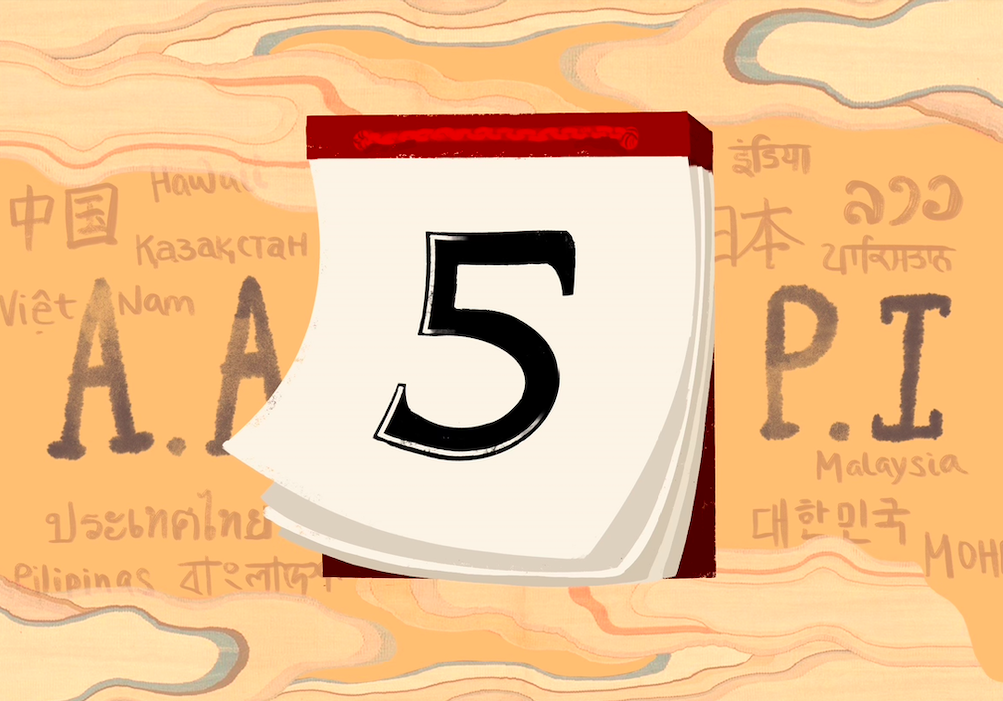
Graphic by Katherine Chong ’25/The Choate News
In 2009, President Barack Obama signed Proclamation 8369, recognizing the month of May as Asian American and Pacific Islander (AAPI) Heritage Month. This declaration was the culmination of years of efforts for broader recognition of the AAPI community, a group that has been historically underrecognized despite nearly 200 years of contributions to the United States. With the significant rise in hate crimes against Asian Americans and newly-launched efforts in the Connecticut state legislature, AAPI Heritage Month has taken on additional meaning this year.
One of the most significant efforts made by CT legislature is the push for House Bill 5282, a bill that would require public schools in the state to integrate a history curriculum recognizing the cultural, political, and social contributions of the AAPI community. Introduced on February 28, 2022, the passing of this bill would be historic, making Connecticut the third state in the U.S. to require AAPI history to be taught in schools. Quan Tran, a Senior Lecturer in Ethnicity, Race, and Migration at Yale University, stated, “What we’re trying to do is expand the conversation on the civic engagement and contributions of Asian Americans, the relationship between Asian Americans and other social groups in the history of the United States and the important roles that Asian Americans play in the history of this country.” Through efforts from Make Us Visible CT, an organization dedicated to raising awareness on AAPI contributions to the US, and other AAPI advocacy groups, House Bill 5282 has passed through the state legislature’s Education and Appropriations Committee.
Asian Americans have been one of the fastest-growing groups in the United States, making up over 7% of the population, with the total population growing nearly 40% over the last decade from 2010 to 2020. Despite this, the voices of the AAPI community and their role in the history of the United States have been historically underrepresented, often leading to the widespread circulation of misperceptions and stereotypes of the community. Asians have also suffered significant discrimination at the hands of the U.S. government, with examples such as the Chinese Exclusion Act, which limited immigration to the U.S. and the forced internment of Japanese Americans during World War II. Given the recent rise in hate crimes against Asian Americans in the context of the Covid-19 pandemic, educating the broader public on the contributions of Asian Americans and their role in this nation’s development has only become more pressing. Anti-Asian hate crimes increased by 339% between 2020 and 2021, according to data published by the Center for the Study of Hate and Extremism. Mr. John C. Yang, the president of the nonprofit civil rights group Asian Americans Advancing Justice (AAJC), said, “Reports of increased anti-Asian hate in 2021 are, sadly, not a surprise … again, our communities are still under attack, and we must continue our efforts to address anti-Asian hate.” Through the passage of Bill 5282 and other broader efforts to heighten awareness of discrimination against Asian Americans, schools and local communities can take a leading role in breaking down prejudices and ensuring that AAPI history is taught alongside the histories of other proud American minorities, including those of the Black and Latinx communities.
For those keen on participating in local activities during AAPI Heritage Month, there are a number of options nearby, including multiple events hosted by the Asian American Cultural Center at Yale University. Yale will also be hosting an AAPI Heritage Month Book Table from 11 a.m. to 1 p.m. in front of the Ross Library, an event for participants to secure a new read or leave suggestions of books written by AAPI authors. There are a number of resources for those who would like to learn more about the AAPI community, such as the University of Connecticut’s resource page. To directly immerse onself in AAPI culture, available opportunities include cooking food based on Asian recipes and enjoying virtual tours of Asian art galleries such as the New Haven Museum and Historical Society.
There is still much work to be done in raising awareness for the AAPI community, both around their contributions to the development of the United States and the historical discrimination that they have suffered. For the U.S. to better uphold its dedication to racial and cultural diversity, it is critical to raise awareness and recognition of the impact of Asian Americans.




